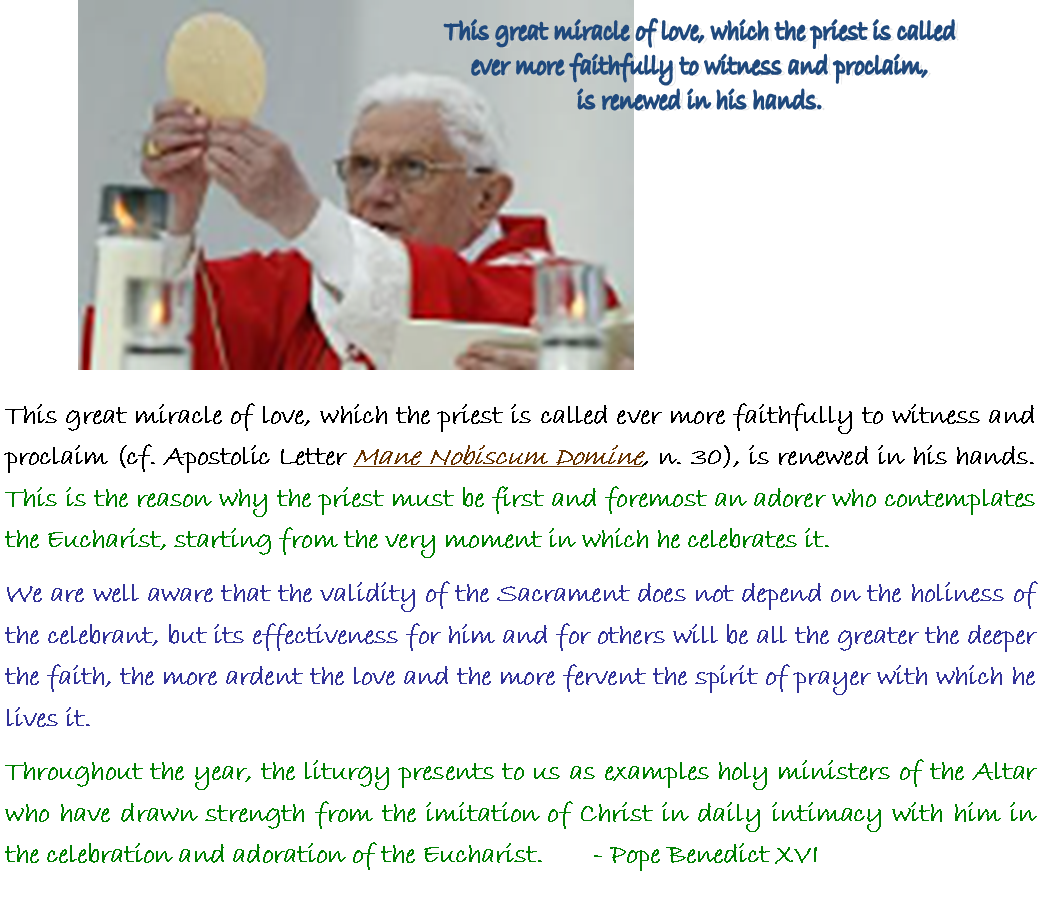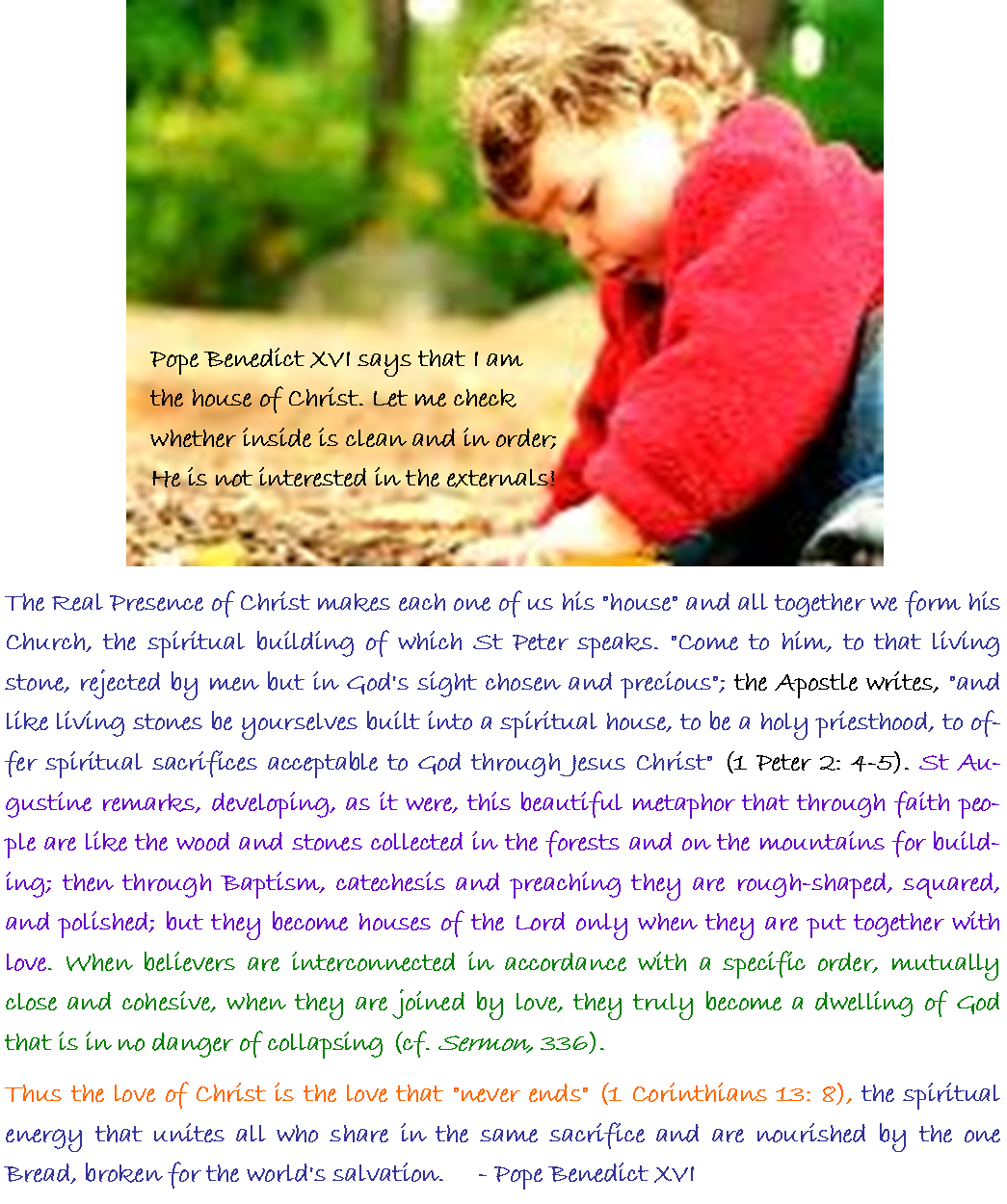|
†253 |

|
The Holy Father then greeted the pilgrims in French, English, German, Spanish, Portuguese, Polish and again in Italian.
To the English-speaking
3. Dear English-speaking Brothers and Sisters: May your visit be a time of renewal in faith, hope and love, that you may be ever more effective witnesses to our Lord and Saviour Jesus Christ. Upon all of you and your families, I invoke abundant divine blessings.
Acknowledgment: We thank the Vatican Publisher for allowing us to publish the Homilies of Saint Pope John Paul II, so that they could be accessed by more people all over the world; as a source of Godís encouragements to all of us.
BENEDICT XVI ANGELUS Castel Gandolfo
Dear Brothers and Sisters,
As the Year of the Eucharist draws to a close, I would like to return to a particularly important subject that was also very dear to my Predecessor, John Paul II: the relationship between holiness, the way and destination of the Church and of every Christian, and the Eucharist.
I am thinking in particular today of priests, in order to emphasize that the secret of their sanctification lies precisely in the Eucharist. By virtue of sacred Orders, the priest receives the gift of and commitment to repeating in the Sacrament the gestures and words with which Jesus instituted the memorial of his Pasch at the Last Supper.
This great miracle of love, which the priest is called ever more faithfully to witness and proclaim (cf. Apostolic Letter Mane Nobiscum Domine, n. 30), is renewed in his hands. This is the reason why the priest must be first and foremost an adorer who contemplates the Eucharist, starting from the very moment in which he celebrates it. We are well aware that the validity of the Sacrament does not depend on the holiness of the celebrant, but its effectiveness for him and for others will be all the greater the deeper the faith, the more ardent the love and the more fervent the spirit of prayer with which he lives it. Throughout the year, the liturgy presents to us as examples holy ministers of the Altar who have drawn strength from the imitation of Christ in daily intimacy with him in the celebration and adoration of the Eucharist. |

|
A few days ago, we commemorated St John Chrysostom, Patriarch of Constantinople at the end of the fourth century. He was described as "golden mouthed" because of his extraordinary eloquence; he was also called "Doctor of the Eucharist" because of the vastness and depth of his teaching on the Most Holy Sacrament. The "Divine liturgy" which is most frequently celebrated in the Eastern Church and which bears his name as well as his motto: "a man full of zeal suffices to transform a people", shows the effectiveness of Christ's action through his ministers.
In our own age, the figure of Padre Pio, St Pius of Pietrelcina, whom we will commemorate this Friday [23 September], stands out. When he celebrated Holy Mass he relived the mystery of Calvary with such intensity so as to edify the faith and devotion of all. Moreover, the stigmata, which God gave to him showed how closely he was conformed to the Crucified Jesus.
Thinking of priests in love with the Eucharist, we cannot in addition forget St John Mary Vianney, the humble parish priest of Ars at the time of the French Revolution. With the holiness of his life and his pastoral zeal, he succeeded in making that little village a model Christian community, enlivened by the Word of God and by the sacraments.
Let us now address Mary, praying especially for priests across the world that they may find in this Year of the Eucharist the fruit of renewed love for the Sacrament which they celebrate. Through the intercession of the Virgin Mother of God, may they always live and witness to the mystery that is placed in their hands for the world's salvation.
---------------------------------------------------------------------------------------
After the Angelus the Pope said:
I extend a warm welcome to all the English-speaking visitors present at today's Angelus. May your time here at Castel Gandolfo and your stay in Rome be filled with joy and deepen your love of the universal Church.
I am delighted to welcome the families of the Focolare Movement that have come from various European Countries for a formation meeting on the values and tasks connected with the Sacrament of Marriage.
I wish everyone a happy and blessed Sunday!
EUCHARISTIC CELEBRATION AND DEDICATION OF THE NEW ALTAR HOMILY OF HIS HOLINESS BENEDICT XVI St Pancratius' Cathedral, Albano
Dear Brothers and Sisters,
Today's celebration is particularly rich in symbols and the Word of God that has been proclaimed helps us to understand the meaning and value of what we are doing. In the First Reading we heard the account of the purification of the Temple and of the dedication of the new altar of burned offering built by Judas Maccabee in 164 B.C., three years after the profanation of the Temple by Antiochus Epiphanes (cf. 1 Maccabee 4: 52-59). The Feast of Dedication which lasted eight days was established to commemorate the event. This feast, initially associated with the Temple to which the people would go in procession to offer sacrifices, was observed with manifestations of joy with the illumination of houses and in this form survived the destruction of Jerusalem. The holy author rightly stresses the joy and gladness characteristic of this event. Yet, dear brothers and sisters, how much greater must be our joy in knowing that on the altar we are preparing to dedicate the sacrifice of Christ that will be offered every day. On this altar he will continue to sacrifice himself in the sacrament of the Eucharist, for our salvation and for that of the whole world.
The Real Presence of Christ makes each one of us his "house" and all together we form his Church, the spiritual building of which St Peter speaks. "Come to him, to that living stone, rejected by men but in God's sight chosen and precious"; the Apostle writes, "and like living stones be yourselves built into a spiritual house, to be a holy priesthood, to offer spiritual sacrifices acceptable to God through Jesus Christ" (1 Peter 2: 4-5). St Augustine remarks, developing, as it were, this beautiful metaphor that through faith people are like the wood and stones collected in the forests and on the mountains for building; then through Baptism, catechesis and preaching they are rough-shaped, squared, and polished; but they become houses of the Lord only when they are put together with love. When believers are interconnected in accordance with a specific order, mutually close and cohesive, when they are joined by love, they truly become a dwelling of God that is in no danger of collapsing (cf. Sermon, 336). |

|
Thus the love of Christ is the love that "never ends" (1 Corinthians 13: 8), the spiritual energy that unites all who share in the same sacrifice and are nourished by the one Bread, broken for the world's salvation. Indeed, how is it possible to communicate with the Lord if we do not communicate with one another? How can we present ourselves divided, distant from one another, at God's altar? May this altar on which the Lord's sacrifice will shortly be renewed, be a constant invitation to you, dear brothers and sisters, to love; you will always approach it disposed to accept love in your hearts, to spread it and to receive and grant forgiveness.
In this regard the Gospel passage that has just been proclaimed offers us an important lesson for life (cf. Matthew 5: 23-24). It is a brief but pressing and incisive appeal for brotherly reconciliation, a reconciliation that is indispensable if we are to present the offering at the altar with dignity; an appeal that takes up the teaching already clearly present in the preaching of the prophets. Indeed, the prophets also forcefully denounced the uselessness of acts of worship that are not accompanied by a corresponding moral approach, especially in relations with others (Isaiah 1: 10-20; Amos 5: 21-27; Micah 6: 6-8). Thus, every time you approach the altar for the Eucharistic Celebration, may your soul be open to forgiveness and fraternal reconciliation, ready to accept the apologies of those who have injured you and ready, in turn, to forgive others.
In the Roman liturgy, when the priest has made the offering of the bread and the wine, he bows to the altar and prays quietly: "Lord God, we ask you to receive us and be pleased with the sacrifice we offer you with humble and contrite hearts". In this way, together with the whole assembly of the faithful, he prepares to enter into the heart of the Eucharistic Mystery, into the heart of that heavenly liturgy to which the Second Reading from Revelation refers. St John presents an Angel who offers "much incense to mingle with the prayers of all the saints upon the golden altar before the throne" of God (cf. Revelation 8: 3). The altar of the sacrifice becomes in a certain way the meeting point between Heaven and earth; the centre, we might say, of the One Church that is heavenly yet at the same time a pilgrim on this earth where, amidst the persecutions of the world and the consolations of God, disciples of the Lord proclaim his Passion and his death until he comes in glory (cf. Lumen Gentium, n. 8). Indeed, every Eucharistic Celebration already anticipates Christ's triumph over sin and over the world and in the mystery shows the radiance of the Church, "the spotless spouse of the spotless Lamb. It is she whom Christ loved and for whom he delivered himself up that he might sanctify her'" (ibid., n. 6).
These reflections generate within us the rite we are preparing to celebrate in this cathedral of yours which today we admire in its renewed beauty, and which you rightly wish to continue to make ever more welcoming and decorous. This is a commitment that involves you all and, in the first place, asks the entire diocesan community to increase in charity and in apostolic and missionary dedication. In practice, it is a question of witnessing with your lives to your faith in Christ and to the total trust that you place in him. It is also a question of fostering ecclesial communion, which is first and foremost a gift, a grace, a fruit of God's freely given love, something, that is, which is divinely effective, ever present and active in history, over and above anything that might appear to the contrary. Ecclesial communion, however, is also a task entrusted to the responsibility of each person. May the Lord grant that you live an ever more convinced and active communion in collaboration and co-responsibility at every level: among priests, consecrated men and women and lay people, among the different Christian communities in your territory and among the various lay associations.
Continue next page Ö
Previous†††††††††††††† Next†††††††††††††† Back†††††††††††††† Home
12 October 2014 |